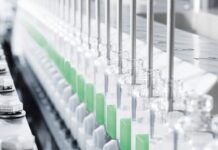Nosopharm specializes in the research and development of new anti-infective drugs, today announces that it has secured funding of EUR 870,000 (USD 1.18 million).
The company is receiving this funding as part of the OOPERA project (Odilorhabdin: Preclinical optimization and study to combat antibiotic resistance), which commenced in the first quarter of 2013 and is scheduled to last three years. A total of EUR 1.6 million (USD 2.2 million) in funding has been allocated to this project.
At the heart of Nosopharm’s work is NOSO-95, a molecule discovered by Nosopharm from an entomopathogenic bacterium of the Xenorhabdus genus. It is the first of the new class of Odilorhabdin antibiotics. It offers significant potential for the treatment of multidrug resistant hospital-acquired infections, particularly those infections caused by Gram-negative pathogens (including the Enterobacteriaceae NDM-1, KPC and BLSE, and Pseudomonas aeruginosa and Acinetobacter baumannii). The funding secured will allow Nosopharm to continue to develop NOSO-95 and to advance it to regulatory preclinical development, immediately prior to human trials.
“This funding confirms that we are on the right track,” said Philippe Villain-Guillot, chairman and CEO of Nosopharm. “It will help us save time and make rapid progress in identifying an antibiotic candidate suitable for regulatory preclinical development.”
Hospital-acquired infections affect four million people in the European Union and nearly two million in the US annually. According to the European Medicines Agency (EMA) and the European Center for Disease Prevention and Control (ECDC), antibiotic-resistant pathogens are the cause of nearly 400,000 hospital-acquired infections and more than 25,000 deaths in the EU each year.
Aside from the detrimental effects on patient health, antibiotic-resistant hospital-acquired infections constitute a real public health problem, incurring considerable additional costs for health systems every year. The European Center for Disease Prevention and Control estimates the additional cost in the European Union to be EUR 1.5 billion (USD 2 billion).
The funding is being made available through the RAPID aid scheme for dual innovation implemented by France’s Armaments Procurement Agency (DGA), the procurement arm of the French Ministry of Defense, and the General Directorate for Competitiveness, Industries and Services, an agency of the Ministry for Industrial Renewal. Under the RAPID scheme, the Armaments Procurement Agency (DGA) finances 80 per cent of the expenditure, with EUR 870,000 (USD 1.18 million) going to Nosopharm and EUR 500,000 (USD 679K) to its academic partners. Nosopharm is contributing EUR 230,000 (USD 312,500). This support highlights the importance of Nosopharm’s endeavors for both military and public health, against a backdrop of the emergence of bacterial infections that are resistant to classic antibiotics and an interest in further extending French SMEs’ capabilities in antibacterial pharmacology.
Nosopharm has used part of the funding secured to recruit three new members of staff in R&D. This takes the company’s total headcount to seven and adds new expertise in medicinal chemistry, supplementing its capabilities in drug discovery and microbiology and strengthening its technological platform.
To bring the project to completion, Nosopharm is supported by its partners: the joint Aix-Marseille University/French Army Biomedical Research Institute UMR-MD1 membrane transporters, chemoresistance and drug design research unit; and the UMR 5253 molecular architectures and nanostructured materials team (AM2N) at the Institut Charles Gerhardt Montpellier (involving researchers from the French National Center for Scientific Research (CNRS), the Ecole Nationale Superieure de Chimie in Montpellier and Montpellier Universities 1 and 2).
About Nosopharm SAS
Nosopharm is a biotechnology company specializing in the research and development of new anti-infective drugs. The company has designed an innovative anti-infective technological platform based on the exploitation of microbial biodiversity for pharmacological applications. It has developed unique expertise in the screening and characterization of bioactive secondary metabolites produced by a novel microbial resource, the bacterial genera Xenorhabdus and Photorhabdus. Founded in February 2009, Nosopharm is based in Nimes, France and currently has a staff of seven.


















